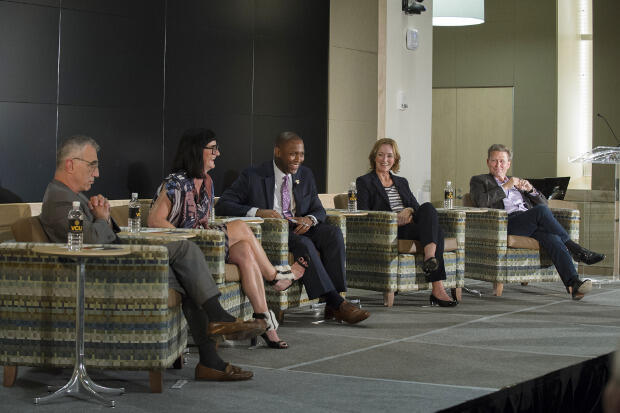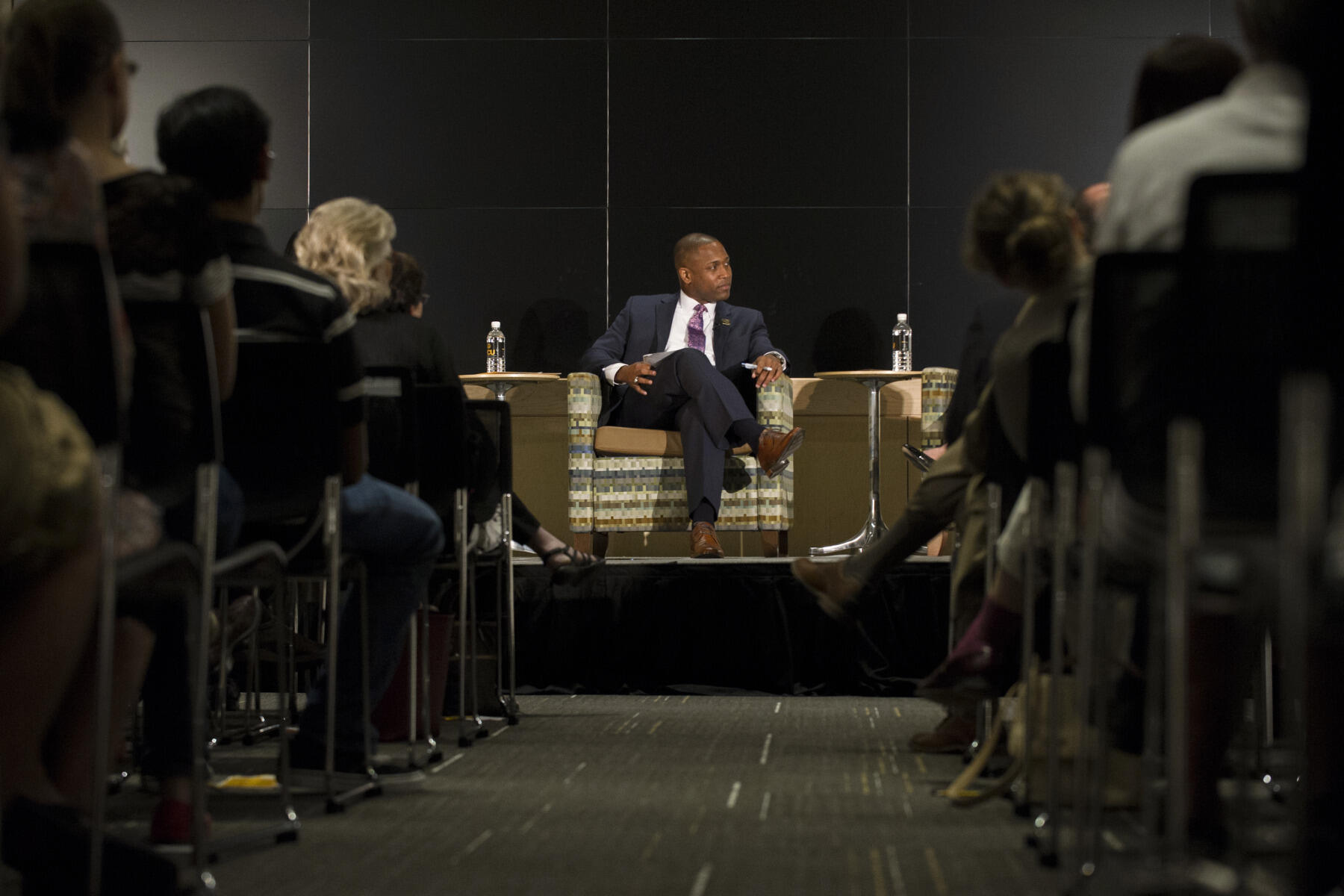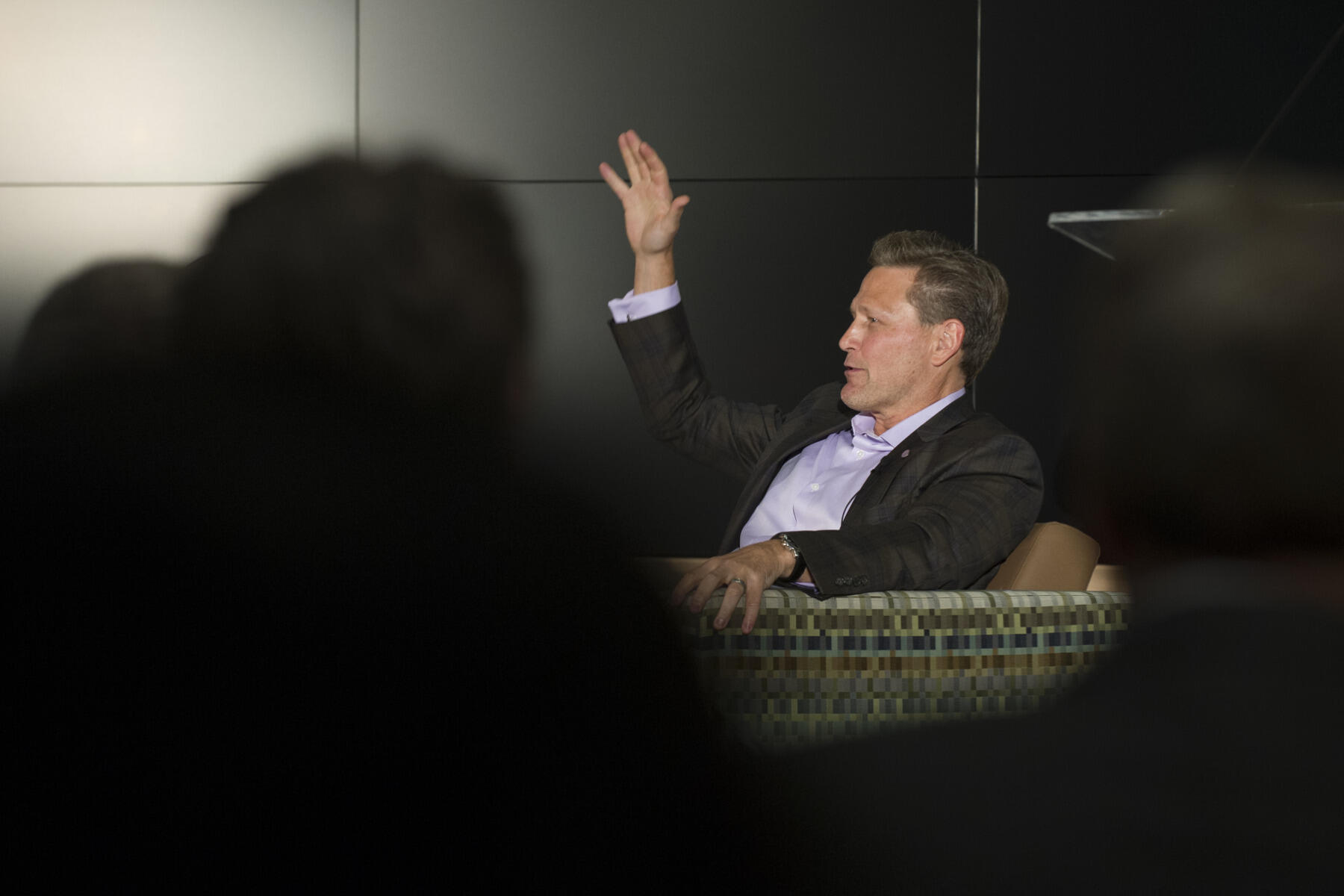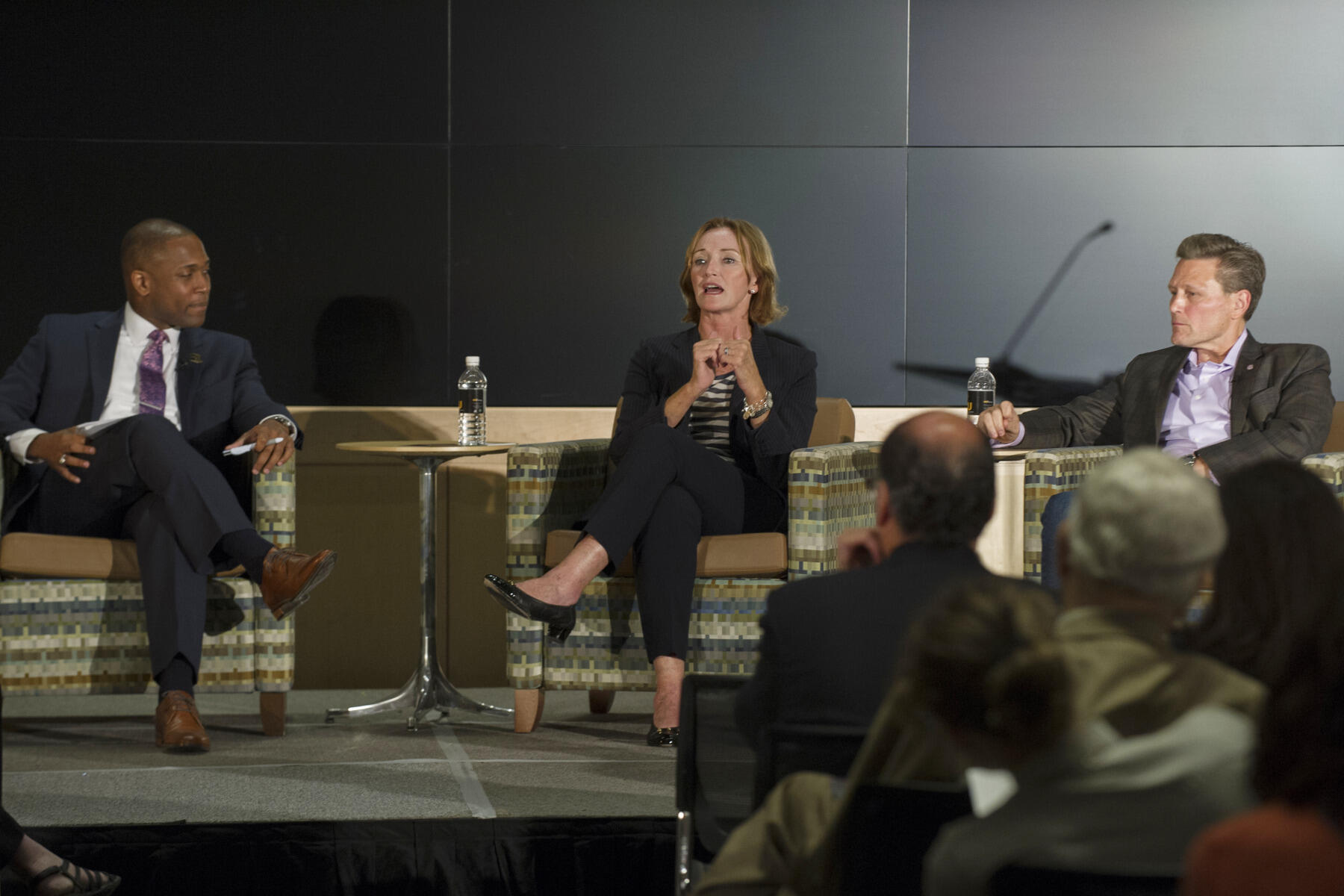
<br>Photos by Julia Rendleman, University Marketing.
Sept. 26, 2016
Accomplished alumni reflect on their careers and the role VCU played in their success
Share this story
Thomas Scalea, M.D., remembers the night he decided he would spend his career in the fast-paced, high-stress world of trauma care. It was August 1977, and he was a fourth-year student in the Virginia Commonwealth University School of Medicine. He was training that month in critical care medicine under the tutelage of Alpha “Berry” Fowler III, M.D., the medical chief resident.
“That month really shaped my life,” Scalea said.
You better put an IV in that guy or he is going to die.
One night Scalea and Fowler were called to the bed of a patient who was turning blue as those attending to him struggled to successfully insert an IV. Fowler turned to Scalea and said, “You better put an IV in that guy or he is going to die.”
Scalea gathered himself, took charge and inserted the IV, and the patient recovered. Soon after, Fowler, who holds the W.T. Thompson Jr. Professorship in Pulmonary Medicine at VCU, put his arm around Scalea and said, “How does it feel to save your first life?”
“From that moment, I knew what I wanted to do,” Scalea said.
Since 1997, Scalea has served as physician-in-chief at the University of Maryland’s R. Adams Cowley Shock Trauma Center, the nation’s only freestanding trauma hospital. He told the story of that life-changing moment Fridaynight at “In Real Life: A Conversation with Distinguished VCU Alumni,” a panel discussion in the Cabell Library featuring four highly accomplished VCU graduates. Joining Scalea were David Baldacci, a bestselling novelist; Marilyn Tavenner, president and CEO of America’s Health Insurance Plans; and Tara Donovan, a widely exhibited artist and winner of the prestigious MacArthur Fellowship. VCU alumnus Aaron Gilchrist, co-anchor of News4Today in Washington, D.C., served as moderator.
The panelists returned to campus to reflect on their careers and to share the ways that their time at VCU influenced their lives and contributed to their success. The event was a centerpiece of the launch of the $750 million Make It Real Campaign for VCU, the largest fundraising campaign in the university’s history.
VCU President Michael Rao, Ph.D., said people are at the heart of VCU’s mission, and it was fitting that the celebration of the campaign would include an opportunity to focus on the ways some of VCU’s alumni had excelled and contributed to the world.
“We believe in the power here to transform other people’s lives,” Rao said.
Finding success through hard work

Although their fields and paths varied widely, the panelists proved united on the key to their success: hard work.
Tavenner reflected on her time at VCU as the university’s “longest-running part-time student” between 1981 and 1989 when she completed her bachelor’s degree from the School of Nursing and her master’s degree in health administration from the School of Allied Health Professions. A mother of two young children at the time, Tavenner also worked full-time. She dedicated herself to working toward her degrees “one semester at a time.” Her disciplined approach led to a wide-ranging career in health care that has included stints as Virginia’s secretary of health and human resources and as administrator/principal deputy administrator of the federal Centers for Medicare and Medicaid Services.
Deep into his career, Scalea continues to work the kind of grueling long hours — including a six-days-a-week surgery schedule — that would break most people. However, he revels in it. Almost every day, he faces a series of life-and-death cases. Instead of finding the parade of intense encounters exhausting, he finds it invigorating.
“I like being the one with the responsibility,” he said. “I like people looking at me. It’s a complicated way to live, but for whatever reason it’s the way I like to live.”
Donovan, who received an MFA from the School of the Arts, said she frequently battles lingering doubts that despite all of her success she is “a fraud” who is “going to get caught.” She has achieved global renown and created numerous beautiful and memorable artworks but finds that creating a new piece has never gotten any easier.
“I have the exact same problems I had 25 years ago, but now more people are watching,” she said.
In response, she said, she simply bears down and puts in the necessary effort to break through that uncertainty.
“I’m not a believer in inspiration,” she said. “It’s all about hard work.”

Baldacci, who received a bachelor’s degree from the College of Humanities and Sciences, remembered that most of his fellow students worked at least part-time jobs when he was a VCU student. In fact, he sometimes attended class close enough to his shift as a security guard that he would wear the uniform to class. That work ethic proved critical when he began to write novels while practicing law. Lawyers might not be popular, Baldacci said, but they do work long hours. Adding a fiction-writing career to his demanding full-time job meant late nights and little sleep, but he did it with the same determination he had employed at VCU. Today, he has written 37 novels. More than 110 million copies are in print worldwide.
‘We’re going to get even better’
Each of the panelists said their experience at VCU has resonated throughout their careers.
Tavenner said VCU’s deep ties to the community and the importance the university placed on public health care helped spark her interest in policy. That burgeoning interest led others to suggest she shift her academic focus from nursing to hospital administration.
“Without that kind of encouragement, I never would have done that,” she said.
Donovan said when she was at VCU the facilities were modest but the energy and expertise were special. “There was a very strong community of people supporting each other,” she said. Donovan reached great heights as a student artist, including being chosen to participate in the Whitney Biennial, but still found she had to start over when she moved to New York after she got her degree. She missed the tight-knit environment that the Department of Sculpture had provided at VCU and she began to try to replicate it in New York.
“I wanted to get back to the place that VCU created for me,” she said.

Today, Donovan has successfully re-created that atmosphere in her studio, where she employs several VCU alumni to help her produce her large-scale installations and sculptures made from everyday objects. Solo exhibitions of her work have been staged in the Metropolitan Museum of Art, the UCLA Hammer Museum and the Corcoran Gallery of Art, among other venues.
VCU influenced Scalea’s approach to medicine before he even was accepted into the school. During his admissions interview, Miles Hench, Ph.D., the dean of admissions, came from behind his desk and sat at a table with Scalea, asking him questions not only directly related to the study of medicine but about Scalea’s passions. The personal touch and emphasis on compassion and caring would be a common theme during Scalea’s subsequent medical school education — a period he has referred to as the best four years of his life — and one that stuck with him.
“The first thing I did when I went into practice was I bought a table and two chairs,” he said. “I never talk to anybody from behind my desk.”
Baldacci said his time at VCU has had an enduring effect on him, too, including his work as a novelist even though his academic focus was political science when he was on campus. In response to an audience question, Baldacci acknowledged that characters inspired by people from VCU had made their way into his novels.
“I’ve killed people from here,” he said with a smile. “The murders were all solved, though.”
Baldacci said the faculty is the key to the VCU experience. Professors and other instructors are ultimately who inspire students, he said, helping them explore new possibilities about themselves.
“I think this university excels at that, and I think we’re going to get even better,” he said.
Subscribe for free to the weekly VCU News email newsletter at http://newsletter.news.vcu.edu/ and receive a selection of stories, videos, photos, news clips and event listings in your inbox every Thursday.
Subscribe to VCU News
Subscribe to VCU News at newsletter.vcu.edu and receive a selection of stories, videos, photos, news clips and event listings in your inbox.










